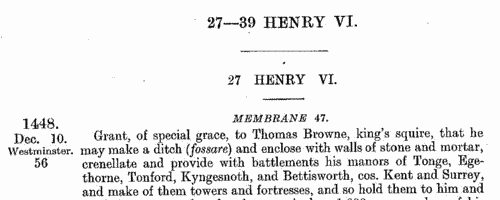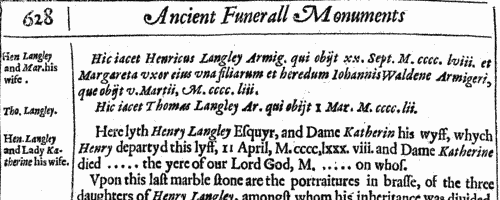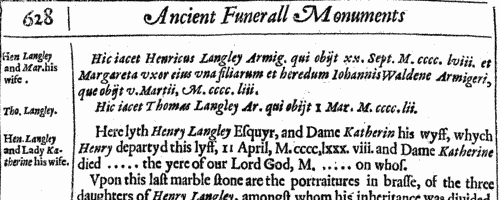Extraneus Surname Ancestry ResultsOur indexes 1000-1999 include entries for the spelling 'extraneus'. In the period you have requested, we have the following 26 records (displaying 21 to 26): Single Surname Subscription | | | Buying all 26 results of this search individually would cost £108.00. But you can have free access to all 26 records for a year, to view, to save and print, for £100. Save £8.00. More... |
These sample scans are from the original record. You will get scans of the full pages or articles where the surname you searched for has been found. Your web browser may prevent the sample windows from opening; in this case please change your browser settings to allow pop-up windows from this site. Norman Rolls
(1200-1417)
The dukedom of Normandy is one of the appendages of the English crown, but actual possession of the dukedom was actively contested by the kings of France. During the periods of English power records were kept for Normandy similar to those of the royal administration in England, with enrolment of letters and grants of liberties and privileges and confirmations of previous enjoyed rights. The rolls for 1200 to 1205 and during the reassertion of English rule under Henry V in 1417, were edited by Thomas Duffus Hardy for the Commissioners of the Public Records, and published in 1835. Most of the persons mentioned are French inhabitants of Normandy or Englishmen in France, but there is also a long section (from page 122 onwards) of valuation of lands of Normans in England, where English jurors, county by English county, attest to acreage, numbers of cattle &c.EXTRANEUS. Cost: £4.00.  | Sample scan, click to enlarge

| Norfolk Feet of Fines
(1307-1485)
Pedes Finium - law suits, or pretended suits, putting on record the ownership of land in Norfolk. These abstracts were prepared by Walter Rye.EXTRANEUS. Cost: £4.00.  | Sample scan, click to enlarge

| Recipients of grants of land by the Crown; and other grantors and grantees
(1427-1516)
Grants of land by the Crown were enrolled on the Charter Rolls: but this series of records was also used by other magnates and religious houses as a way of having their own deeds inspected, confirmed and registered. It will be seen from this that some of the material described in these inspeximuses dates back to a considerably earlier period. In addition, there is an appendix of fragments of charter roll material from 1215 and 1286 to 1288. The royal grants enrolled relate not only to land, but also to various privileges that were part of the royal prerogative.
Most of the material is from England, the remainder relating to Ireland, Wales and possessions in France, but virtually nothing from Scotland, which was an independent kingdom at this period.EXTRANEUS. Cost: £4.00.  | Sample scan, click to enlarge

| Hastings family deeds
(1100-1600)
John Harley of the Historical Manuscripts Commission was invited by Reginald Rawdon Hastings to examine his family's extensive archives at the Manor House, Ashby de la Zouche, in Leicestershire. Harley produced a detailed calendar, of which is the first volume, published in 1928, Hastings himself having since died, and Harley having been killed at Gallipoli. This volume covers four categories of the records: the Ancient Deeds; Manorial and other Documents; Accounts and Inventories; and Miscellaneous Papers. Most, but not all, of the material is mediaeval. About half of the deeds relate to the family property in Leicestershire; then there are sections for Derbyshire, Nottinghamshire, Northamptonshire, Lincolnshire, Warwickshire, Staffordshire, Yorkshire, Northumberland, Norfolk, Cambridgeshire, Huntingdonshire, London, Wiltshire, Somersetshire, Devonshire, Buckinghamshire, Oxfordshire, &c. The manorial section includes a partitions of the estates of the Earls of Leicester and Wilton about 1204 and 1277; manor court rolls are mentioned, but not extracted. Choicer items from the family accounts and inventories are copied in extenso for 1596 and 1607, and thereafter summarised. Most of the later material is merely dipped into for curiosities.EXTRANEUS. Cost: £4.00.  | Sample scan, click to enlarge

| Ancient Funeral Monuments in Middlesex
(1631)
John Weever compiled, by travel and study, this collection of 'Ancient Fvnerall Monvments within the Vnited Monarchie of Great Britaine, Ireland, and the Islands adiacent, with the dissolued Monasteries therein contained: their Founders, and what eminent Persons haue beene in the same interred. As also the death and bvriall of certaine of the Blood Royall; the Nobilitie and Gentrie of these Kingdomes entombed in forraine Nations. A worke reuiuing the dead memory of the Royall Progenie, the Nobilitie, Gentrie, and Communaltie, of these his Maiesties Dominions. Intermixed and illustrated with variety of Historicall obseruations, annotations, and briefe notes, extracted out of approued Authors, infallible Records, Lieger Bookes, Charters, Rolls, old Manuscripts, and the Collections of iudicious Antiquaries. Whereunto is prefixed a Discourse of Funerall Monuments. Of the Foundation and fall of Religious Houses. Of Religious Orders. Of the Ecclesiasticall estate of England. And of other occurrences touched vpon by the way, in the whole passage of these intended labours.' Although he was working before the iconoclasms of the Commonwealth period, the mediaeval memorials that he sought to record were already often mutilated and decayed, the inscriptions illegible or fragmentary, and many of those that he found recorded by earlier antiquaries had completely disappeared. His collection includes not merely physical monuments, but also, where he could find them, burial records and obits from the earlier centuries. This part of his work covers Middlesex outside the cities of London and Westminster.EXTRANEUS. Cost: £6.00.  | Sample scan, click to enlarge

| Ancient Funeral Monuments in Norfolk
(1631)
John Weever compiled, by travel and study, this collection of 'Ancient Fvnerall Monvments within the Vnited Monarchie of Great Britaine, Ireland, and the Islands adiacent, with the dissolued Monasteries therein contained: their Founders, and what eminent Persons haue beene in the same interred. As also the death and bvriall of certaine of the Blood Royall; the Nobilitie and Gentrie of these Kingdomes entombed in forraine Nations. A worke reuiuing the dead memory of the Royall Progenie, the Nobilitie, Gentrie, and Communaltie, of these his Maiesties Dominions. Intermixed and illustrated with variety of Historicall obseruations, annotations, and briefe notes, extracted out of approued Authors, infallible Records, Lieger Bookes, Charters, Rolls, old Manuscripts, and the Collections of iudicious Antiquaries. Whereunto is prefixed a Discourse of Funerall Monuments. Of the Foundation and fall of Religious Houses. Of Religious Orders. Of the Ecclesiasticall estate of England. And of other occurrences touched vpon by the way, in the whole passage of these intended labours.' Although he was working before the iconoclasms of the Commonwealth period, the mediaeval memorials that he sought to record were already often mutilated and decayed, the inscriptions illegible or fragmentary, and many of those that he found recorded by earlier antiquaries had completely disappeared. His collection includes not merely physical monuments, but also, where he could find them, burial records and obits from the earlier centuries. This part of his work covers Norfolk.EXTRANEUS. Cost: £6.00.  | Sample scan, click to enlarge

|
Research your ancestry, family history, genealogy and one-name study by direct access to original records and archives indexed by surname.
|








